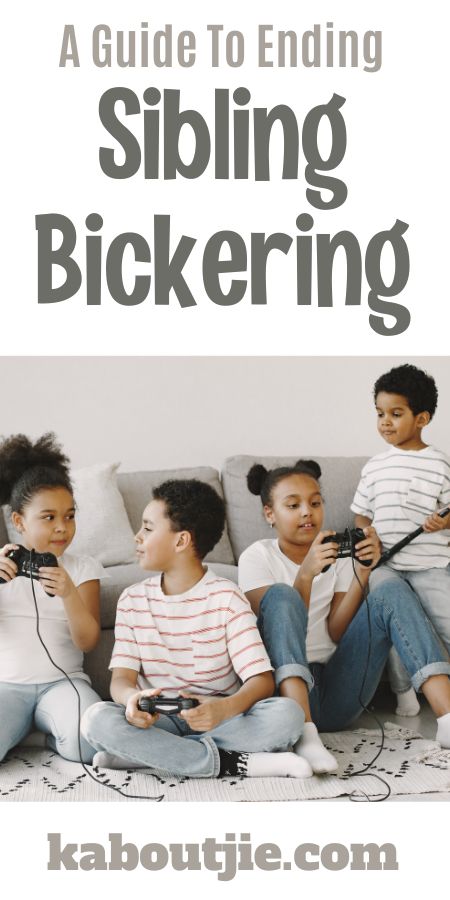sIn every household with siblings, bickering seems almost inevitable. While sibling rivalry is a natural part of growing up, incessant arguments can strain family dynamics. However, it’s possible to create a harmonious environment where siblings coexist peacefully. Here are some effective strategies to curb sibling bickering and foster a more amicable atmosphere at home.

Understand the Root Cause
Understanding the root cause of sibling bickering is crucial to effectively address and diminish ongoing conflicts. Often, sibling disputes are multi-faceted, stemming from various underlying factors. One primary reason is the innate need for attention and validation. Siblings may vie for parental attention, especially in situations where one feels neglected or overshadowed by the other. This competition for acknowledgment might escalate into arguments or rivalries.
Differences in personalities, interests, or temperaments can contribute to conflicts. Siblings may have contrasting preferences, leading to disagreements over various matters, from sharing toys to differences in opinions. Feelings of jealousy or perceived unfair treatment can also spark conflicts, especially when one sibling feels that the other receives preferential treatment.
Developmental stages and age gaps can play a role. Younger children might feel a sense of inferiority or powerlessness, leading them to provoke conflicts as a means of asserting themselves. Conversely, older siblings might feel burdened by responsibilities or expectations placed upon them.
By recognising these underlying factors, parents can address specific issues and implement targeted strategies to mitigate sibling bickering, fostering a more harmonious environment within the family.
Encourage Open Communication
Encouraging open communication among siblings lays the foundation for resolving conflicts and building stronger relationships within the family. Creating an environment where children feel comfortable expressing their thoughts and emotions fosters mutual understanding and empathy.
Parents play a pivotal role in promoting open communication by actively listening to their children without judgment. Validating their feelings, even if different from one’s own perspective, helps children feel heard and understood. Teaching them to articulate their emotions using “I” statements instead of blaming each other fosters constructive dialogue.
Setting aside dedicated family time for discussions encourages siblings to express themselves freely. Family meetings can serve as a platform for sharing feelings, addressing concerns, and brainstorming solutions to existing conflicts. This practice not only resolves immediate issues but also teaches valuable communication skills that children can carry into their adulthood.

Set Clear Boundaries And Expectations
Establishing clear boundaries and expectations is fundamental in reducing sibling bickering and fostering a harmonious household. Clarity regarding acceptable behaviour and consequences helps children understand the limits and promotes a sense of accountability.
Setting specific rules tailored to the family’s dynamics ensures consistency in addressing conflicts. Clearly outlining guidelines regarding sharing, personal space, and mutual respect provides a framework for expected behaviour. For instance, establishing rules about taking turns with shared belongings or specifying quiet times for individual activities can prevent misunderstandings and reduce potential conflicts.
Consistency in enforcing these boundaries is key. Parents should communicate and enforce consequences consistently when rules are breached, reinforcing the importance of respecting boundaries. However, it’s equally essential to praise and reinforce positive behaviour, emphasising the value of cooperation and respectful interactions between siblings.
Involving children in the process of setting rules and consequences can instil a sense of ownership and understanding. Discussing the rationale behind the rules helps children comprehend the purpose and importance of these boundaries, making them more likely to adhere to them willingly.
By establishing clear boundaries and consistently enforcing them, parents create a structured and predictable environment that minimises misunderstandings and conflicts among siblings. This approach fosters a sense of security and promotes healthier interactions, laying the groundwork for a more peaceful household.
Teach Conflict Resolution Skills
Teaching conflict resolution skills equips children with invaluable tools to navigate disagreements, fostering healthier relationships and minimizing sibling bickering. Encouraging them to employ effective strategies when conflicts arise cultivates a sense of empowerment and cooperation.
Emphasising the importance of active listening is paramount. Encourage siblings to listen attentively to each other without interruptions, allowing both parties to express their thoughts and feelings. Teaching them to rephrase or summarise what the other person said helps ensure mutual understanding.
Promoting the use of “I” statements encourages children to express their feelings without blaming or accusing the other person. Phrases like “I feel upset when…” or “I would prefer…” enable them to communicate their emotions without escalating tensions.
Teaching negotiation and compromise skills is crucial. Encourage siblings to brainstorm solutions together, fostering a collaborative environment. Finding mutually agreeable compromises helps in resolving conflicts amicably, encouraging a sense of fairness and understanding each other’s perspectives.
Acknowledging and validating emotions is essential. Teaching children that it’s okay to feel angry or upset but not okay to hurt others helps them manage emotions constructively. Encouraging them to express their feelings through words or alternative outlets like drawing or writing can prevent conflicts from escalating.

Foster Sibling Bonding Activities
Fostering sibling bonding activities is an effective way to promote unity, understanding, and camaraderie among siblings, reducing the likelihood of constant bickering. Engaging in shared experiences creates lasting memories and strengthens the bond between brothers and sisters.
Encouraging collaborative activities where siblings work together towards a common goal fosters teamwork and cooperation. Whether it’s cooking together, building a fort, or creating a family scrapbook, these activities encourage communication, problem-solving, and compromise.
Participating in outdoor adventures or sports activities provides an opportunity for siblings to support each other, learn from shared experiences, and develop a sense of camaraderie. Playing team sports, going on hikes, or simply spending time in nature promotes a sense of unity and shared enjoyment.
Engaging in creative pursuits like arts and crafts, music, or storytelling allows siblings to express themselves while collaborating on projects. Such activities encourage self-expression, stimulate creativity, and nurture a sense of pride in jointly created work.
Involving siblings in household chores or tasks instils a sense of responsibility and teamwork. Working together to accomplish chores not only lightens the workload but also promotes cooperation and mutual appreciation for each other’s efforts.
Lead By Example
Leading by example is a powerful method for shaping sibling dynamics and reducing bickering. Parents serve as role models whose behaviours and attitudes significantly influence how children interact and resolve conflicts among themselves.
Demonstrating effective communication by listening actively and respectfully to each family member sets a precedent for healthy dialogue. Modelling empathy and understanding during disagreements teaches children the importance of considering others’ perspectives and feelings.
Displaying conflict resolution skills in your own interactions, such as calmly discussing differences and finding compromises, showcases the value of respectful negotiations. Avoiding aggressive or disrespectful behaviour, and instead opting for constructive problem-solving, illustrates how to handle conflicts peacefully.
Showcasing mutual respect and support within the family reinforces the idea of a supportive environment. Demonstrating kindness, appreciation, and encouragement towards each child fosters a positive atmosphere and encourages siblings to emulate these behaviours in their interactions.
Being mindful of how conflicts are managed and resolved within the parental relationship also influences how children perceive and handle disagreements. Consistently exhibiting behaviours that prioritise understanding, compromise, and respect sets a precedent for how siblings should engage with one another.

Provide Individual Attention
Providing individual attention to each child within a family dynamic is crucial for mitigating sibling bickering and nurturing a harmonious environment. Each child deserves personalised time and acknowledgment, which can significantly reduce feelings of rivalry and competition.
Spending quality one-on-one time with each child helps foster a stronger bond and demonstrates that each child is valued as an individual. Engaging in activities tailored to their interests or simply having meaningful conversations allows for a deeper connection and understanding.
Acknowledging and celebrating each child’s unique achievements and strengths fosters a sense of self-worth and reduces the need for validation through sibling rivalry. This recognition helps children feel appreciated for their individual qualities, diminishing the urge to compete for attention.
Being attentive to each child’s emotional needs and concerns creates an environment where they feel heard and understood. Actively listening to their thoughts, worries, and aspirations shows that their feelings are important and valued.
Ensuring fairness in parental attention and involvement is vital. Balancing time spent with each child prevents feelings of favouritism and reduces potential triggers for sibling conflicts.
Encourage Empathy And Respect
Encouraging empathy and respect among siblings forms the cornerstone of harmonious relationships. Instilling these values fosters understanding, consideration, and a sense of mutual regard within the family.
Empathy can be nurtured by encouraging children to imagine themselves in their siblings’ shoes, understanding their feelings and perspectives. Teaching them to recognise emotions and respond empathetically cultivates a deeper understanding of each other’s experiences.
Promoting active listening and validating each other’s emotions encourages a culture of respect. When siblings feel heard and understood, it fosters an environment where they’re more likely to reciprocate the same respect and understanding.
Encouraging siblings to find common ground and appreciate each other’s differences further enhances empathy and respect. Celebrating each other’s strengths and supporting each other’s weaknesses fosters a sense of unity and cooperation.
Seek Professional Help When Needed
In some cases, sibling conflicts might persist despite implementing various strategies. Don’t hesitate to seek professional guidance if the situation doesn’t improve or if conflicts escalate to a concerning level. Family therapy or counselling can provide valuable insights and tools to address underlying issues.
Conclusion
Sibling bickering is a common aspect of family life, but with patience, understanding, and proactive strategies, it can be managed effectively. Creating a nurturing environment that encourages communication, empathy, and mutual respect lays the foundation for healthy sibling relationships. By implementing these strategies, parents can help their children develop strong bonds that will last a lifetime.
Remember, fostering a peaceful home environment isn’t about eliminating conflict entirely but rather teaching children the skills to navigate and resolve conflicts positively.
References
Provide any sources or experts consulted for additional guidance and insights.
Note: This blog post is intended for informational purposes only and does not replace professional advice.
 Kaboutjie SA Mommy Blogs by Lynne Huysamen
Kaboutjie SA Mommy Blogs by Lynne Huysamen





These are all really good tips. and very interesting to read.
I’m glad you found these tips useful Naomi 🙂